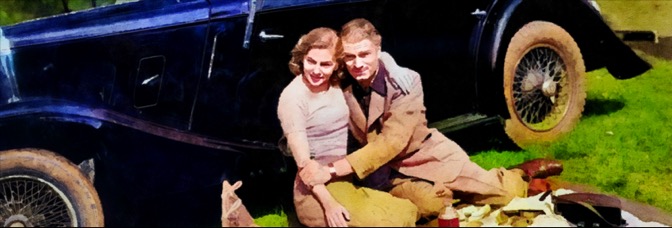Rebecca opens with protagonist Joan Fontaine narrating, establishing the present action as a flashback—which is kind of important considering how much danger Fontaine will be in throughout. She’s got to make it since there’s the narration. Some of that danger is in Fontaine’s head. Or, at least, she sometimes apprehensive of the wrong person. Sort of.
Rebecca is a passionate romance, a suspenseful thriller, and a reluctant character study. Fontaine’s nameless protagonist isn’t the one being studied, but rather her new husband, played by Laurence Olivier. Olivier’s a little older and a lot richer. He’s a relatively recent widower (Rebecca is the first wife), and he sweeps naive Fontaine off her feet.
The narration establishes the eventual setting—Olivier’s seaside estate—before heading to Fontaine and Olivier’s version of a meet-cute. They’re in Monte Carlo; she’s out sketching and comes across him on a cliff. She’s sure he’s going to jump. So, technically, maybe not a meet cute.
They soon meet again under formal circumstances. Fontaine is a paid companion to obnoxious rich lady Florence Bates. Bates knows Olivier socially, but he can’t stand her. However, once Bates gets a bug, Olivier and Fontaine become vacation buddies. Fontaine’s performance during these sequences is fantastic; the various emotions play out on her face as she observes Olivier, trying to figure out what’s happening.
What’s happening is a whirlwind romance; they leave Monte married. They’ll go on a honeymoon, which we see later on in home movies, but the action cuts from vacation to the estate. In the opening, director Hitchcock does what he can to make it not look too much like a miniature, but… it looks like a miniature. When Fontaine and Olivier arrive home, however, there’s this great composite shot of them driving up. The estate is a miniature, we won’t get any significant, closer exterior shots, but with that composite shot, Hitchcock makes sure the audience knows not to hold that kind of status against the film.
The film quickly introduces the new supporting cast—Judith Anderson as the imposing housekeeper who loved Rebecca, Reginald Denny as the estate manager, Gladys Cooper as Olivier’s sister, and Nigel Bruce as her comic relief husband. Olivier looses Fontaine to figure out how to run the house with Anderson’s help.
At this point, Olivier will orbit further and further away from Fontaine until they have their big second-act blowout. He’s busy being back but also actively neglecting to tell Fontaine anything about the house itself and how Rebecca liked it to be run. Much of the film during the second act is just Fontaine finding out more and more details Olivier really should’ve told her about. Why did he ever bring her there if Rebecca was so amazing? Since Olivier doesn’t confide in anyone, all the characters have a different impression of how Fontaine is supposed to function as the new lady of the estate. And since they all assume Olivier’s told Fontaine, no one gives her any context, with that lack knocking her between bewildered, overwhelmed, and frightened without any rest.
Hitchcock mounts whole set pieces just to showcase Fontaine’s discomfort and possible danger. There’s lots of beautiful work from Hitchcock, photographer George Barnes, and editor W. Donn Hayes. Fontaine acts the heck out of the scenes—and she’s the one who continues the character arc after the scenes forebodingly fade to black—but they’re technical marvels. Rebecca’s a great-looking (and sounding) film.
Just as Fontaine starts feeling like she should exert some agency, she tries to bond with Anderson over a favor—George Sanders, Rebecca’s favorite cousin, visits one day when OIivier’s out of town, and Fontaine promises to keep it a secret. Assuming she and Anderson share any kind of bond will be one of Fontaine’s worst mistakes.
Sanders is an abject delight. Rebecca’s got lots of great performances—while Fontaine gets a great showcase for the first three-quarters, Olivier then gets to play leading man for a bit and overshadows her—but Sanders is always a reliable scene stealer. He appears, takes over, then returns control on exit. It’s a fabulous balance. The three share a particularly great scene together.
The film has two major plot reveals to answer all the questions, tie up all the loose ends—one comes before the third act, one finishes off the film. In between those two reveals, Rebecca metamorphizes.
What follows is a very different film—still a romance and thriller, but with a different pace and narrative distance. Hitchcock changes things up for the finish, turning it into a race against time, then another, then another, all while bounding along the razor’s edge of melodrama. It’s a phenomenal success, delivering on many last-minute promises and giving the cast even further ranges to essay.
Hitchcock relies on a special effects set piece to close things out (did we forget there’s a narration safety net?), which has the added benefit of calling a draw on the performances. Fontaine has the most character development, while Olivier gets to do a great reveal and then excel further. Sanders and Anderson also have their singular qualities. Maybe it’s right no one can overshadow anyone else… they (and we) are all trapped in Rebeccas magnificent grasp.
This post is part of the Second Master Of Suspense Blogathon hosted by Maddy of Classic Film and TV Corner.


Leave a Reply